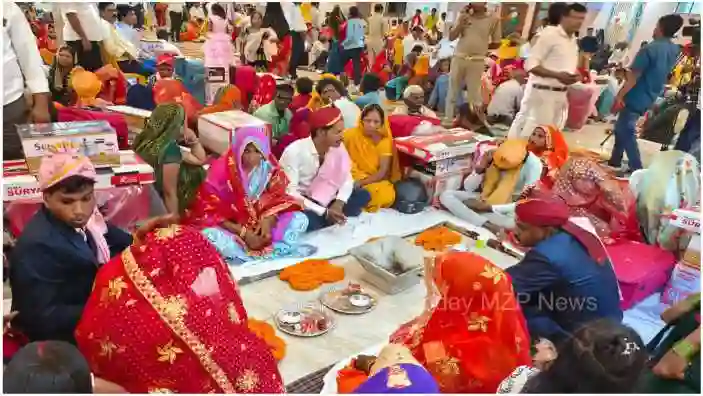In a bizarre and shocking incident, a case of fraud has surfaced in Hathras, Uttar Pradesh, where a brother and sister reportedly married each other to fraudulently receive government benefits intended for newly married couples. The scandal doesn’t end there; several married couples also tied the knot again under false pretenses, all to exploit the Mukhyamantri Samuhik Vivah Yojana, a state-sponsored mass marriage scheme aimed at economically weaker sections of society.
This fraudulent scheme has left the community stunned, raising serious concerns about the misuse of government funds and the potential loopholes in monitoring such welfare programs. The case was brought to light after concerned local residents filed a complaint, prompting the authorities to take swift action. The local Sub-Divisional Magistrate (SDM) has since ordered a thorough investigation into the matter.
What Is the Mukhyamantri Samuhik Vivah Yojana?
The Mukhyamantri Samuhik Vivah Yojana is a community marriage scheme initiated by the Uttar Pradesh government. The scheme promises financial and material support to couples from economically weaker sections of society. Under the scheme, the government provides:
- ₹35,000 to the bride, deposited into her bank account.
- Essential goods worth ₹10,000 for the couple.
- ₹6,000 towards marriage expenses.
The initiative aims to ease the financial burden on families and promote mass marriages as a way to encourage simplicity in wedding ceremonies. However, this latest scandal has exposed how unscrupulous individuals are using the scheme to exploit public funds for personal gain.
How Did the Scam Unfold?
According to reports, the scam involved two married couples from Sikandrarao, who remarried under the scheme to fraudulently claim the government benefits. But perhaps the most shocking aspect of the scam is the case of a brother and sister who allegedly got married to take advantage of the same benefits.
Local residents were quick to raise the issue, suspecting foul play when the fraudulent marriages were discovered. After receiving multiple complaints, the local SDM, Ved Singh Chauhan, immediately ordered an investigation. The reports suggest that a municipal employee played a central role in orchestrating these fake marriages to siphon off public funds.
A Community Outraged: Local Reaction
The Hathras community has been left shocked and outraged by the scandal. Local residents, who reported the case, expressed their anger over the misuse of government schemes. “This is a blatant misuse of funds meant to help the poor. Those responsible for organizing these fraudulent marriages must be held accountable,” said one resident.
What makes this fraud particularly egregious is the involvement of government employees. It has been alleged that a municipal worker helped arrange the fake marriages, taking advantage of the loopholes in the system. This raises important questions about transparency and accountability in the implementation of government welfare programs.
Government Action: Investigation Underway
Following the exposure of this scandal, SDM Ved Singh Chauhan has assured the public that a proper investigation will be carried out. Speaking to the media, Chauhan stated, “We will investigate the matter thoroughly, and strict action will be taken against those found guilty.”
The SDM also added that the investigation will look into the role of government employees and others involved in organizing these fraudulent marriages. This scandal has prompted local authorities to scrutinize the mass marriage event held in Hathras on December 15, 2023, during which 217 couples were married.
Fraud in Welfare Schemes: A Widespread Issue?
This case highlights a broader issue: the misuse of government welfare schemes. While the Mukhyamantri Samuhik Vivah Yojana is designed to support economically disadvantaged couples, this scandal in Hathras suggests that corruption and fraud are becoming more common in the implementation of such schemes.
Instances of fake beneficiaries and corrupt officials taking advantage of government funds are not new in India, but this particular case has stirred public outrage due to the extreme nature of the fraud—particularly the involvement of siblings pretending to be a married couple.
The state government will now have to address the loopholes in the system and introduce stricter monitoring mechanisms to prevent such fraudulent activities in the future. Failure to do so could undermine the entire purpose of the Mukhyamantri Samuhik Vivah Yojana and erode public trust in government welfare programs.

Past Scandals and Future Concerns
This is not the first time a government welfare scheme has been mired in controversy. Across India, there have been multiple cases of fake beneficiaries and forged documents being used to exploit schemes meant for the poor. The Pradhan Mantri Awas Yojana and Mid-Day Meal Scheme are just a few other examples of programs that have been targeted by fraudsters.
The Hathras case is yet another wake-up call for authorities to tighten the screws on how these schemes are managed. More audits and random checks need to be conducted to ensure that the funds are reaching the intended beneficiaries. If no action is taken, we might continue to see more of these cases cropping up in other parts of the country.

Will Justice Be Served?
As the investigation continues, it remains to be seen how those responsible for this brazen scam will be punished. The involvement of government employees has added another layer of complexity to the case, and many are demanding that strict action be taken against the perpetrators.
For now, the focus remains on uncovering the full extent of the fraud. Will the government be able to prevent future scams, or is this just the tip of the iceberg? Only time will tell, but one thing is clear—public trust in welfare programs is at stake, and the state administration must act swiftly to restore faith in these essential schemes.

